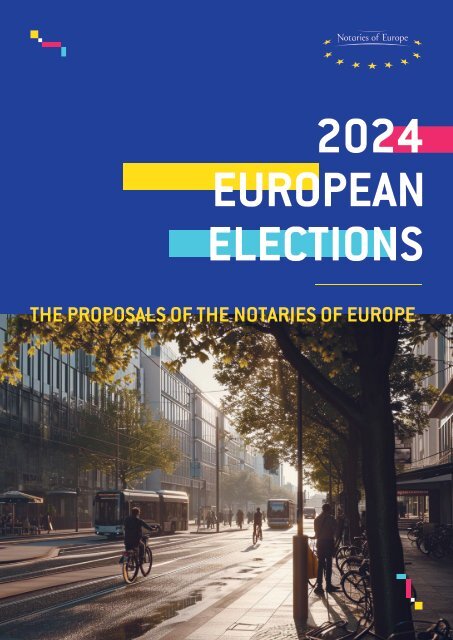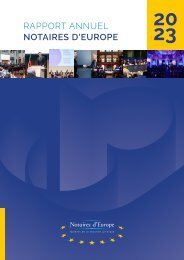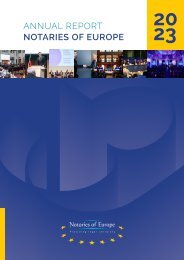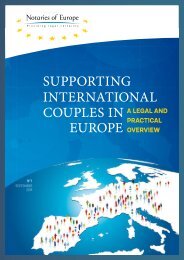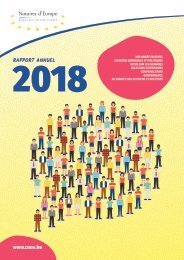Manifeste 2024 European Elections
Manifeste 2024 European Elections
Manifeste 2024 European Elections
Create successful ePaper yourself
Turn your PDF publications into a flip-book with our unique Google optimized e-Paper software.
PROVIDING LEGAL CERTAINTY<br />
FOR ALL EUROPEANS<br />
Currently, citizens in Europe are confronted with a<br />
rapidly changing environment and uncertainties,<br />
such as geopolitical developments, environmental<br />
challenges and digitalisation in particular with artificial<br />
intelligence. Institutions which deliver stability,<br />
mutual trust and legal certainty contribute to strengthen<br />
citizens’ trust in <strong>European</strong> policies. The Notaries<br />
of Europe pursue these goals. As legal advisors<br />
to citizens and businesses, they accompany them<br />
throughout the major stages of life: marriage<br />
contract, purchase of real estate, settlement of a<br />
succession, creation and amendments of company<br />
statutes, etc. Every month, several million clients<br />
come through the door of a notary’s office.<br />
Faced with a constant increase in the number of<br />
cases with a cross-border element, the Notaries of<br />
Europe have resolutely committed to working alongside<br />
the <strong>European</strong> institutions to provide legislative<br />
and practical solutions to the problems of citizens<br />
whose lives are now part of the <strong>European</strong> area.<br />
While economic borders have been abolished<br />
thanks to the single market, too often legal borders<br />
remain. That is why the Notaries of Europe have<br />
implemented concrete solutions in recent years<br />
such as the <strong>European</strong> Directory of Notaries<br />
(www.notaries-directory.eu), the <strong>European</strong> Notarial<br />
Network (www.enn-rne.eu), and the <strong>European</strong><br />
Network of Registers of Wills Association (ENRWA,<br />
www.arert.eu), which works to interconnect registers<br />
of wills and <strong>European</strong> Certificates of Succession.<br />
The Notaries of Europe are also involved in improving<br />
knowledge of <strong>European</strong> law and the law of other<br />
Member States by providing thematic websites<br />
https://www.coupleseurope.eu/fr/<br />
such as Couples https://www.coupleseurope.eu/<br />
in Europe, Succession https://www.successions-europe.eu/?lang=en<br />
in Europe,<br />
https://www.the-vulnerable.eu/?lang=en https://www.buyingmyhome.eu/?lang=en<br />
The Vulnerable in Europe or Buying property in<br />
Europe.<br />
THE CNUE IN A NUTSHELL<br />
The CNUE (Council of the Notariats of the<br />
<strong>European</strong> Union) now represents the notariats<br />
of 22 Member States of the <strong>European</strong><br />
Union, as well as 7 notariats with observer<br />
status, to the <strong>European</strong> institutions. The<br />
CNUE’s mission is to promote the notariat<br />
and its active contribution to any decision-making<br />
processes of the <strong>European</strong><br />
Union that affect the legal aspects of<br />
citizenship and running a business, access<br />
to justice and consumer protection.<br />
22<br />
MEMBERS<br />
50 000<br />
NOTARIES<br />
7 OBSERVER<br />
MEMBERS<br />
200 000<br />
EMPLOYEES<br />
2
In the context of the <strong>2024</strong>-2029 legislature, the<br />
Notaries of Europe call on the <strong>European</strong> institutions<br />
to renew their support for an ambitious multiannual<br />
funding policy in the field of justice. They have also<br />
drawn up a list of priorities for future MEPs, members<br />
of the <strong>European</strong> Commission and the Council. Finally,<br />
as a revision of the Treaties is envisaged in the<br />
coming years, they wish to reiterate the importance<br />
of the heritage of Romano-Germanic law.<br />
These proposals are the subject of this manifesto,<br />
unanimously adopted on 8 December 2023 in Brussels<br />
by the elected representatives of the 22<br />
members of the Council of the Notariats of the <strong>European</strong><br />
Union (CNUE).<br />
3
ENSURING LEGAL CERTAINTY IN AN<br />
INCREASINGLY UNCERTAIN<br />
DIGITAL WORLD<br />
Despite the impressive technical developments and<br />
possibilities offered by technology, citizens and<br />
businesses today are increasingly confronted with<br />
difficulties in identifying reliable or fake information<br />
which might also have an impact on legal transactions.<br />
Digitalisation of notarial authentic instruments and<br />
performing notarial acts remotely via digital means<br />
can simplify and accelerate certain matters for<br />
citizens and companies. At the same time, however,<br />
this can sow the seeds of new forms of abuse and<br />
deception. If notaries suspect that such actions are<br />
taking place, they must be able to request their<br />
clients to meet, discuss and advise them in person.<br />
This “emergency brake“ in the digital process should<br />
always be available to a notary and needs to be regulated<br />
within the <strong>European</strong> Union.<br />
As a key player in the digitalisation of justice in<br />
Europe, the CNUE strives to ensure trust and legal<br />
certainty in the digital world. To this end, it can rely<br />
on a solid foundation put in place by its members at<br />
national level: creation and interconnection of registers,<br />
dematerialisation of data transfer, setting-up of<br />
companies online, deployment of electronic signature,<br />
electronic authentic instruments and public<br />
videoconferencing procedures with highly reliable<br />
identification mechanisms.<br />
The COVID-19 crisis proved to be a real stress test for<br />
all the Member States' legal systems and highlighted<br />
the need for a coherent legislative framework at<br />
<strong>European</strong> level. In response, the <strong>European</strong> institutions<br />
have been particularly active with numerous<br />
legislative proposals: digitalisation of cross-border<br />
judicial cooperation, revision of the <strong>European</strong><br />
e-IDAS/e-ID Regulation, upgrading of digital company<br />
law, etc.<br />
4
In this context, the CNUE strives to make use of the<br />
new opportunities of digitalisation to continue the<br />
efficient and effective work of notaries in Europe.<br />
This new digital infrastructure will empower citizens<br />
and businesses and will make their daily lives easier.<br />
While pursuing digital pathways, the CNUE will advocate<br />
to uphold also in the digital sphere the procedural<br />
safeguards, legal certainty and data security of<br />
the analogue world. It is essential that the development<br />
of digital solutions in a cross-border context,<br />
including artificial intelligence, does not undermine<br />
legal certainty and access to the law for our fellow<br />
citizens. It is important to take into account the<br />
situation of those who do not have the knowledge or<br />
the opportunity to use digital technology in their<br />
daily lives. Therefore, the CNUE endeavours to<br />
address the questions of the future, including the<br />
challenges that arise in this new digital context<br />
without compromising on legal certainty.<br />
• The Notaries of Europe are ready to shape the digital reality and future<br />
developments as front-runners.<br />
• However, in order to include the entire population, but also to prevent<br />
fraudulent transactions, <strong>European</strong> legislation cannot exclude the possibility<br />
of in-person procedures.<br />
• In terms of electronic identification and for the future <strong>European</strong> digital<br />
wallet, the highest levels of security need to be adopted, in order to<br />
secure the protection of privacy and confidential data within the EU.<br />
• In developing a <strong>European</strong> framework on artificial intelligence, the<br />
CNUE supports a “human-based approach”: making the final decision<br />
should always be left to a human legal professional and not to an automated<br />
system.<br />
5
2 - BETTER PROTECTING CITIZENS’ RIGHTS<br />
The <strong>European</strong> Union has set itself the objective of<br />
defining common rules in family law so that citizens<br />
are not hindered in the exercise of their rights<br />
because they live in different countries of the <strong>European</strong><br />
Union or because they have moved from one<br />
country to another in the course of their lives.<br />
Important regulations have been adopted over the<br />
past two decades to build bridges between national<br />
law systems, such as <strong>European</strong> regulations on international<br />
successions, matrimonial property regimes,<br />
registered partnerships and the circulation of public<br />
documents.<br />
6
More recently, the <strong>European</strong> Commission has published<br />
a proposal for a Regulation on parenthood, as<br />
well as a legislative package to strengthen the<br />
cross-border protection of adults. Access to justice<br />
for vulnerable persons is another major social issue<br />
and a challenge for the <strong>European</strong> Union, which needs<br />
to pay more attention to this when developing its<br />
policies.<br />
• The CNUE calls for a swift adoption of the legislative package on the<br />
cross-border protection of adults.<br />
• The <strong>European</strong> Union must consider unifying conflict-of-law rules at<br />
<strong>European</strong> level in new areas: adoption, celebration of marriage, cohabitation<br />
agreement, absence (legal effects of the disappearance of an<br />
individual beyond a certain period of time).<br />
• Since all Member States have ratified the UN Convention on the Rights<br />
of Persons with Disabilities, it is now essential that its main principles<br />
guide the <strong>European</strong> Union’s actions, in particular the right to autonomy<br />
and access to justice.<br />
• For the proper application of <strong>European</strong> legislation, the training of legal<br />
practitioners, in particular that of notaries, must be encouraged and<br />
supported by the <strong>European</strong> Union.<br />
7
3 - FACILITATING THE SETTLEMENT OF<br />
SUCCESSIONS IN EUROPE<br />
Since 17 August 2015, Regulation (EU) No 650/2012<br />
has been in force and greatly facilitates the settlement<br />
of international successions in Europe. In the<br />
majority of Member States, notaries are the main<br />
contact point for all matters relating to succession<br />
law.<br />
Building on this practical experience, the CNUE published<br />
in March 2023 the results of the "MAPE Successions"<br />
project, the aim of which was to assess the<br />
application of Regulation (EU) No 650/2012 on international<br />
successions by notaries.<br />
https://www.notariesofeurope.eu/en/notaries/mape-successions/<br />
https://www.notariesofeurope.eu/en/notaries/mape-successions/<br />
The issue of digital assets is also a growing concern<br />
of <strong>European</strong> citizens. It is now necessary to define<br />
and regulate digital assets through appropriate EU<br />
legislation. The Notaries of Europe are committed to<br />
working on the drafting of digital clauses in the provisions<br />
of wills that can take into account the<br />
deceased’s online presence and his or her assets:<br />
electronic contact details, passwords, account numbers,<br />
photos, videos, music, etc. Because the digital<br />
markets and services involved are cross-border, this<br />
is an issue that must be dealt with at EU level.<br />
During this two-year project, more than 2,100 notaries<br />
contributed and shared their experiences on a<br />
wide range of topics covered by the Regulation: rules<br />
of jurisdiction, choice of applicable law, acceptance<br />
of authentic instruments, <strong>European</strong> Certificate of<br />
Succession, etc. All these data were analysed and<br />
discussed by a team of academics and notaries, who<br />
presented their recommendations. The data collected<br />
are particularly valuable to evaluate the Regulation<br />
by the <strong>European</strong> Commission, with a view to a<br />
possible revision.<br />
8
• In view of an evaluation of the Regulation (EU) No 650/2012, the CNUE<br />
will make available to the <strong>European</strong> Commission the data collected<br />
under the MAPE Successions project.<br />
• Considering the revision of the same Regulation, the CNUE calls for its<br />
recommendations to be put in place. In particular, via the <strong>European</strong><br />
Network of Registers of Wills Association (ENRWA – www.arert.eu), the<br />
CNUE supports the creation and interconnection of registers of <strong>European</strong><br />
Certificates of Succession and of open and closed succession<br />
proceedings.<br />
• The CNUE calls for uniform <strong>European</strong> rules on digital assets.<br />
• The CNUE supports the introduction of <strong>European</strong> legislation to limit<br />
double taxation in succession matters.<br />
• The CNUE calls for a <strong>European</strong> portal to be set up to enable those<br />
responsible for settling successions to easily find the details of financial<br />
institutions where the deceased have bank accounts, employee<br />
savings accounts and life insurance policies.<br />
9
4 - PROMOTING THE RELIABILITY OF REGISTERS<br />
The quality and transparency of registers are key<br />
elements of a competitive <strong>European</strong> economy. For<br />
their activities within the internal market, economic<br />
operators must be able to rely on true, correct and<br />
reliable information. These are also essential components<br />
for the Member States in their fight against<br />
money laundering and the financing of terrorism as<br />
well as in support of the enforcement of sanctions.<br />
To achieve this, it is essential that register data are<br />
being checked by public authorities such as courts,<br />
administrative authorities or notaries that act in the<br />
public interest and are strictly supervised and<br />
adhere to special procedural law.<br />
More than ever, with the increasing digitalisation of<br />
procedures, it is imperative to ensure the reliability<br />
of registers. In particular, the creation and interconnection<br />
of registers should not be achieved at the<br />
expense of legal certainty. For this reason, the CNUE<br />
calls on the <strong>European</strong> institutions to ensure that<br />
robust safeguards are in place to guarantee the reliability<br />
of registers.<br />
• In the public interest, the CNUE supports the principle of preventive<br />
control by a public authority, including public office holders, of the data<br />
published in the various registers, so that everyone in Europe can rely<br />
on them.<br />
• The CNUE calls on the <strong>European</strong> institutions to implement proper safeguards,<br />
ensuring that the published data in the register is reliable to<br />
facilitate its cross-border use.<br />
10
5 - ACTING IN THE FIGHT AGAINST<br />
MONEY LAUNDERING<br />
The Notaries of Europe are a central element in the<br />
Member States’ measures to combat money laundering.<br />
They have an obligation to inform public authorities<br />
of any suspicions they may have about a<br />
financial operation or transaction. They implement<br />
the recommendations developed by the Financial<br />
Action Task Force (FATF) and the resulting <strong>European</strong><br />
legislation.<br />
This is why the fight against money laundering is a<br />
real challenge for the authorities, requiring them -<br />
and also sensitive sectors - to be increasingly<br />
vigilant. In this context, the <strong>European</strong> institutions<br />
ensure that the legislative framework is adapted to<br />
the realities on the ground. In this respect, a new<br />
legislative package is expected to enter into force<br />
very quickly.<br />
However, money laundering techniques are<br />
constantly evolving, using new resources and<br />
following the evolution of technologies. This phenomenon<br />
is also inherently transnational, not only<br />
disregarding borders, but using them to blur the<br />
tracks of successive financial operations carried out<br />
across the planet and thus obstructing the course of<br />
justice. According to a FATF estimate, the annual<br />
volume of money laundering operations represents<br />
between 2 and 5 % of global GDP.<br />
• The CNUE calls for swift adoption of the legislative package by the <strong>European</strong> institutions<br />
and for the new regulatory framework to be put in place without delay.<br />
• To act even more effectively in the fight against money laundering, the<br />
CNUE calls on the <strong>European</strong> Union for greater support for the training of<br />
practitioners, such as notaries.<br />
• The CNUE asks the <strong>European</strong> Union to work on the establishment of specific<br />
tools for cooperation between Member States and practitioners.<br />
11
6 - FOSTERING THE DEVELOPMENT OF<br />
NON-CONTENTIOUS JUSTICE IN EUROPE<br />
Notaries participate in the exercise of non-contentious<br />
justice which contributes to the prevention of<br />
costly litigation. This is why, the legislator calls on<br />
notaries to relieve the administrative, judicial, and<br />
financial burdens: in numerous Member States, notaries<br />
are empowered with non-contentious procedures<br />
such as successions. This transfer of tasks to<br />
notaries increases the efficiency of procedures and<br />
thereby benefits citizens’ access to justice.<br />
Other examples of such preventive justice are notarial<br />
functions in the area of the protection of vulnerable<br />
adults, the celebration of marriages before a<br />
notary, and the settlement of amicable divorces by<br />
the notary which is currently already possible in a<br />
growing number of Member States.<br />
In addition to saving time and money, transfer of<br />
powers from the courts and from the public administration<br />
to notaries contribute to the efficiency of<br />
justice and to the improvement of the functioning of<br />
States. Against this background, it is noteworthy to<br />
mention that notaries, as public office holders,<br />
uphold essential procedural standards such as<br />
impartiality, independence and hearing of the<br />
parties within the meaning of the requirements on<br />
fundamental principles of the rule of law.<br />
Ultimately, this strengthens the rule of law for the<br />
benefit of all <strong>European</strong> citizens. In those Member<br />
States where notaries perform court functions, they<br />
also fulfil the requirements of Article 6 ECHR and Art<br />
47 EU-CFR.<br />
12
• The CNUE calls for the use of preventive justice procedures in the adoption<br />
of future <strong>European</strong> legislation.<br />
• The CNUE proposes to better include non-contentious justice in <strong>European</strong><br />
activities on improving the efficiency of justice systems.<br />
• The CNUE asks for notaries acting in non-contentious procedures to<br />
have access to all mutual assistance tools put in place to facilitate<br />
individual case handling (e.g. the <strong>European</strong> Judicial Network in civil and<br />
commercial matters).<br />
13
7 - STANDING BY UKRAINE<br />
On 24 February 2022, the international community<br />
was horrified to witness the Russian Federation’s<br />
invasion of Ukraine, a free country, a democracy. In<br />
response to the brutality of these actions, the CNUE<br />
quickly mobilised to provide an institutional and<br />
on-the-ground response to the crisis.<br />
On 1 March 2022, the Ukrainian Chamber of Notaries<br />
was granted observer member status of the CNUE.<br />
Within the framework of the <strong>European</strong> Notarial<br />
Network, the CNUE has developed and published a<br />
practical handbook on Ukrainian law for notaries, as<br />
well as a series of fact sheets on Ukraine for the<br />
general public.<br />
In addition, the CNUE has published a multilingual<br />
electronic form to safeguard the interests of unaccompanied<br />
Ukrainian minors, who find refuge in EU<br />
countries with relatives and friends. Finally, the<br />
Notaries of Europe also play a leading role in the<br />
implementation of sanctions against Russia and<br />
Belarus.<br />
• Given the important role played by notaries in company and real<br />
estate transactions, the CNUE wishes to step up its cooperation with the<br />
<strong>European</strong> Commission in order to better enforce sanctions against<br />
Russia and Belarus.<br />
• An effective judicial system, based on prevention and legal certainty,<br />
is an essential component of the rule of law. Through financial support,<br />
the <strong>European</strong> Union must help practitioners and administrations to<br />
quickly preserve and rebuild the foundations necessary for a stable and<br />
predictable legal framework, which is a prerequisite for sustainable<br />
economic and social development.<br />
14
The support provided for the rule of law, the preventive<br />
administration of justice in wartime and the<br />
reconstruction of Ukraine after the war is one of the<br />
CNUE’s major political priorities. In view of this,<br />
providing legal certainty is of highest importance<br />
as is building trust when it comes to future investments<br />
in the Ukrainian economy.<br />
In particular, the full guarantee of constitutional<br />
property rights, the legal settlement of family and<br />
succession procedures, the protection of the most<br />
vulnerable members of society and the restoration<br />
of public registers have to be taken into account in<br />
the process of reconstruction of the country.<br />
15


